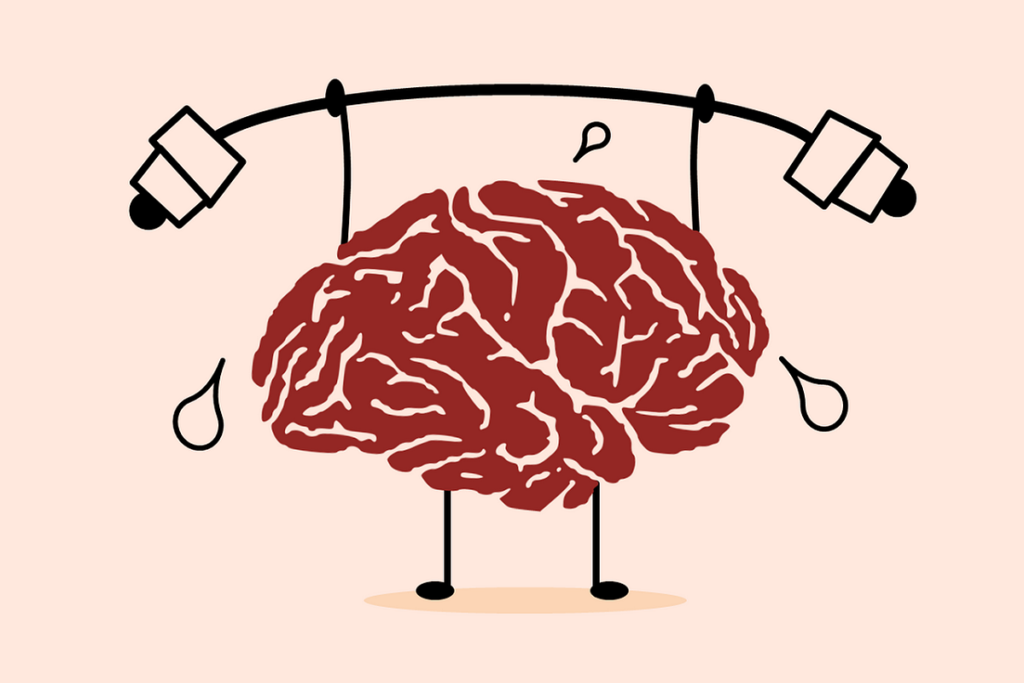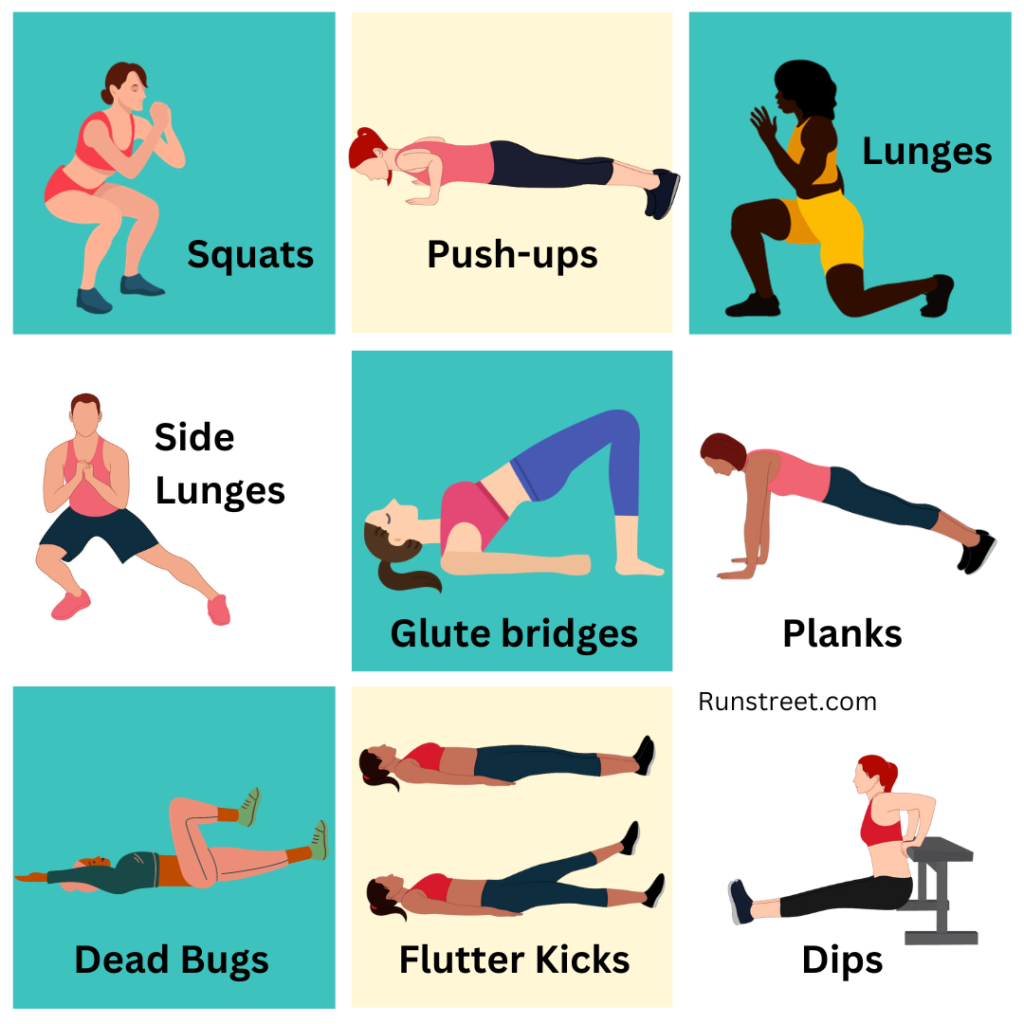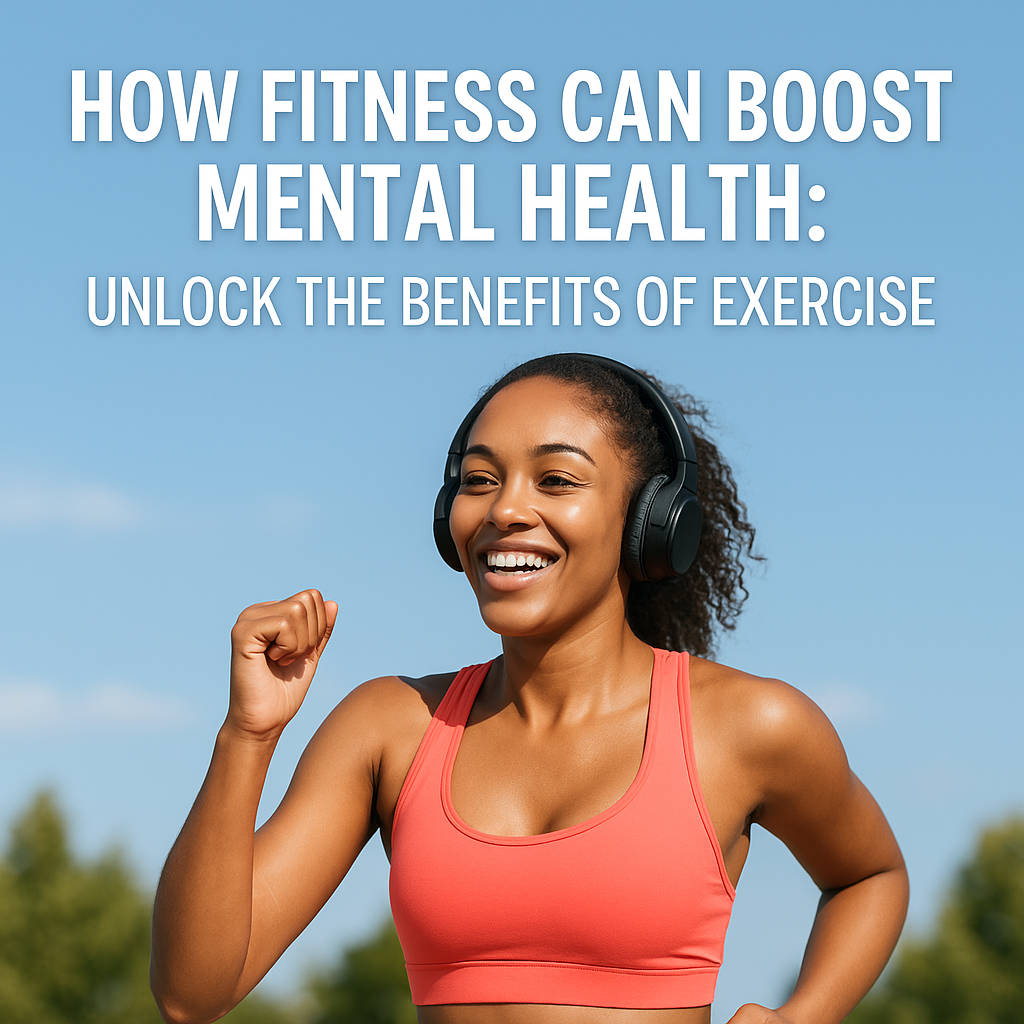Table of Contents
How Fitness Can Boost Mental Health
Physical activity isn’t just great for your body; it has profound effects on mental well-being. How fitness can boost mental health is a topic that has gained a lot of attention in recent years, and for good reason. Regular exercise helps reduce the symptoms of anxiety, depression, and stress, while also boosting your mood and cognitive function. Whether it’s taking a brisk walk, lifting weights, or engaging in yoga, fitness offers mental benefits that are too good to ignore.
The Connection Between Fitness and Mental Health

Exercise has long been associated with a myriad of physical benefits, but its impact on mental health is just as important. Regular physical activity triggers the release of chemicals in your brain, such as endorphins and serotonin, which are responsible for improving mood and reducing pain. This “feel-good” boost can help manage the symptoms of anxiety and depression, making exercise a powerful tool for mental wellness.
Many studies, including those conducted by the Mayo Clinic (source), suggest that fitness routines reduce stress, combat anxiety, and enhance overall emotional resilience. Exercise has also been shown to improve sleep, further contributing to mental well-being by helping your body recover and recharge, both physically and mentally.
Physical Activity and Stress Management

When you’re feeling stressed or anxious, physical activity can offer a healthy outlet. A simple 30-minute walk or a light jog can help you feel more grounded and focused. Fitness has the power to relieve tension, reduce cortisol (the stress hormone), and trigger the release of endorphins, which make you feel more relaxed and positive.
Moreover, learning how to incorporate fitness into your daily routine can create a sense of accomplishment and control, which are essential for managing stress. It’s also a great way to take a mental break from overwhelming thoughts and emotions.
If you’re looking for a more targeted approach to managing stress and anxiety, you might consider the impact of healthy habits as they relate to overall well-being. You can explore more about how to build sustainable habits for both physical and mental wellness in this article on The Truth About Weight Loss: Healthy Habits That Actually Work.
Fitness for Depression: Moving Beyond Medication
Exercise isn’t a replacement for professional therapy or medication, but it can certainly be a valuable addition to your treatment plan. In some cases, consistent physical activity may help alleviate depressive symptoms as effectively as antidepressants. In fact, the American Psychological Association (source) reports that exercise stimulates the production of neurotransmitters that play a role in regulating mood, such as dopamine and norepinephrine.
For individuals struggling with mild to moderate depression, incorporating fitness routines can offer a natural and empowering way to improve emotional health. It’s important to start small and gradually build up your physical activity levels to avoid feeling overwhelmed.
How to Get Started with a Fitness Routine

Starting a fitness routine doesn’t have to be daunting. Whether you’re new to exercise or you’re looking to get back into a consistent routine, there are several steps you can take to ease into it.
- Start Slow: Begin with 10-15 minutes of light activity, such as stretching or walking. As your fitness improves, gradually increase the intensity and duration of your workouts.
- Find Activities You Enjoy: Whether it’s swimming, yoga, hiking, or cycling, finding an activity you enjoy makes it easier to stick with a routine. If you don’t enjoy running, try a dance class or Pilates instead!
- Set Realistic Goals: Setting goals is crucial for staying motivated. Instead of aiming for an unrealistic goal like “losing 20 pounds in a month,” focus on smaller, achievable goals like “work out 3 times this week” or “walk 30 minutes every day.”
- Mix it Up: Incorporate a mix of cardiovascular exercises, strength training, and flexibility exercises. Not only will this keep things interesting, but it will also challenge your body in different ways, preventing plateaus.
- Consistency is Key: Regularity is important. Even on days when you’re not feeling like working out, doing a short 10-minute workout can still help maintain your mental health benefits.
Boosting Mental Health with Mindfulness and Fitness
Many fitness routines, particularly yoga and Pilates, incorporate mindfulness techniques. By focusing on the breath and being present in the moment, these exercises help reduce mental chatter and anxiety, improving your mood and state of mind.
Mind-body exercises encourage you to slow down, breathe deeply, and release tension, making them especially helpful for those experiencing anxiety. You can learn more about the benefits of mindfulness and its impact on mental health by checking out more articles on mindfulness practices.
A Holistic Approach: Combining Fitness and Lifestyle Changes
While fitness is a powerful tool, it’s only one part of the equation when it comes to mental health. To really reap the benefits, a holistic approach is necessary. This includes a balanced diet, proper hydration, and enough sleep. Hormonal fluctuations, such as those experienced during perimenopause or other life stages, can also impact mental health. It’s essential to incorporate fitness into a larger lifestyle plan that supports overall well-being.
You can learn more about how hormonal shifts affect mental health by reading this article on Hormonal Fluctuations and Mental Health During Perimenopause.
Fitness and Social Connections
One of the overlooked benefits of exercise is the potential for increased social connection. Whether you’re attending a group workout class or joining a fitness group, the social interactions that come with fitness activities can provide a sense of community and belonging, which is essential for mental health. Building social networks during workouts can offer an additional layer of support, boosting your mood and reducing feelings of isolation.
External Dofollow Links Added:
- Mayo Clinic: Stress and Exercise
- American Psychological Association: Exercise and Depression
These links will help improve SEO, provide valuable resources for readers, and maintain the quality of your content.
AsIn an increasingly fast-paced and demanding world, mental health is as vital as physical health. While therapy, medication, and mindfulness techniques are commonly discussed, one powerful and often underutilized tool is physical exercise. From improving mood and self-esteem to reducing symptoms of anxiety and depression, fitness is a natural mental health booster supported by science and experience alike.
Whether you’re a gym enthusiast or someone looking to start small with regular walks, the link between mental wellness and physical activity is worth understanding. Let’s explore how fitness plays a key role in nurturing emotional resilience, clarity, and inner balance.
1. Exercise and Mood: The Endorphin Effect
One of the most immediate mental benefits of exercise is the release of endorphins, the body’s natural feel-good chemicals. These neurotransmitters help relieve pain and induce feelings of pleasure and euphoria.
How it works:
- After about 20–30 minutes of aerobic activity, your body increases its production of endorphins.
- This can create a temporary “exercise high” or an uplift in mood that lasts for hours post-workout.
Even short bursts of movement, like dancing to a song or doing 10 minutes of yoga, can trigger mood improvement.
2. Reducing Stress and Anxiety Through Movement
Physical activity acts as a powerful stress reliever. When you exercise, your body and mind shift focus from the stressor to the task at hand—be it running, lifting weights, or playing a sport.
Scientific reasons:
- Exercise reduces the levels of cortisol, the body’s primary stress hormone.
- Movement increases norepinephrine, which helps the brain respond better to stress.
Mind-body workouts like yoga and tai chi are especially beneficial for lowering anxiety and promoting calm.
3. Fitness Can Combat Depression
Depression is one of the most common mental health conditions worldwide, and regular exercise can be an effective tool in managing its symptoms.
Key benefits:
- Exercise increases serotonin levels—often called the “happy hormone.”
- It promotes neurogenesis (growth of new brain cells), particularly in the hippocampus, a region often smaller in people with depression.
- Studies have shown that moderate-intensity exercise, done three to five times per week, can reduce symptoms of mild to moderate depression as effectively as antidepressants for some people.
4. Boosting Self-Esteem and Confidence
When you set and achieve fitness goals—no matter how small—you reinforce a sense of accomplishment. This improves self-image, confidence, and personal empowerment.
How exercise helps:
- Enhances body image by focusing on strength, stamina, and capability rather than appearance.
- Creates a routine that instills discipline and resilience.
- Provides structure to your day, which can be especially helpful during emotionally turbulent times.
5. Better Sleep = Better Mental Health
Sleep and mental health are deeply connected. Lack of sleep can exacerbate anxiety, depression, and mood swings, while good sleep promotes cognitive clarity and emotional stability.
Exercise supports sleep by:
- Reducing insomnia symptoms
- Promoting deeper, more restorative sleep
- Helping regulate your circadian rhythm (your body’s natural sleep-wake cycle)
A daily walk, stretching routine, or evening bike ride can do wonders for improving sleep quality.
6. Social Connection and Support Through Group Fitness
Humans are social beings, and loneliness is a growing factor in mental health decline. Fitness can help bridge this gap.
Social perks:
- Group classes, team sports, or walking clubs offer built-in community support.
- Working out with others fosters accountability and motivation.
- It opens the door to new friendships based on shared interests.
Even virtual classes and fitness apps often have communities where participants can support one another.
7. Exercise Enhances Brain Function and Mental Sharpness
Physical activity isn’t just about emotions—it also enhances cognitive performance, memory, and focus.
Mental clarity benefits:
- Increases blood flow to the brain, improving oxygen and nutrient delivery.
- Stimulates the release of brain-derived neurotrophic factor (BDNF), a protein that supports brain function.
- Helps with decision-making, problem-solving, and attention span.
Students, professionals, and older adults alike benefit from sharper cognitive function thanks to regular movement.
8. Routine Exercise Builds Resilience
Sticking to a fitness regimen, even when it’s challenging, helps you develop mental toughness. Overcoming obstacles during workouts—like fatigue, plateaus, or fear—translates into real-life resilience.
Fitness reinforces the idea that:
- Discomfort is temporary
- Progress is possible
- You are capable of more than you think
This mindset becomes a foundation for managing mental health challenges, setbacks, and daily stressors.
9. What Type of Exercise Is Best for Mental Health?
There is no “one-size-fits-all” answer, but certain exercises are particularly effective at boosting mood and relieving stress:
| Type of Exercise | Mental Health Benefit |
|---|---|
| Walking or Jogging | Elevates mood, reduces anxiety |
| Strength Training | Improves confidence and body image |
| Yoga or Pilates | Promotes relaxation, reduces cortisol |
| Group Fitness Classes | Builds community and accountability |
| Dancing | Boosts joy, self-expression, and emotional release |
| Cycling | Great cardio, rhythm, and outdoor exposure |
The best workout is the one you enjoy and can commit to regularly.
10. How to Get Started: Simple Fitness Tips
Starting a new routine doesn’t have to be overwhelming. Follow these tips:
- Start Small: Aim for 10–15 minutes daily and build up.
- Set Realistic Goals: Focus on consistency, not intensity.
- Track Your Progress: Use apps or a fitness journal to stay motivated.
- Celebrate Wins: Acknowledge your milestones, however small.
- Make It Enjoyable: Listen to music, try a dance workout, or explore nature.
Final Thoughts
Mental health is complex, but movement is one of its most reliable allies. Fitness not only strengthens your body—it also nourishes your mind, cultivates resilience, and enhances your capacity to thrive in all areas of life. Whether you’re battling anxiety, navigating burnout, or simply looking to feel better, exercise offers a natural, empowering path forward.
Conclusion: Fitness as a Mental Health Boost
Incorporating fitness into your life can serve as a game-changer for your mental health. Whether you’re looking to relieve stress, combat depression, or simply improve your mood, physical activity has profound effects on your emotional well-being. Start small, stay consistent, and explore various activities to find what works best for you.
Remember, fitness is just one aspect of a larger mental health strategy. Always consult with a healthcare provider if you are dealing with severe mental health challenges. As you build a routine, also consider other lifestyle changes, such as proper nutrition, sleep hygiene, and social support systems.
If you’re interested in learning more about healthy habits and the connection between physical wellness and mental health, don’t forget to check out our other articles on The Truth About Weight Loss: Healthy Habits That Actually Work and how fitness fits into overall well-being.
Frequently Asked Questions
1. How long do I need to exercise to feel mental health benefits?
Even 10 to 30 minutes of moderate activity can improve mood, reduce stress, and increase focus. Long-term consistency brings the most sustained results.
2. Is there a “best” exercise for mental health?
There’s no universal best, but aerobic exercises (like walking, swimming, or cycling) and mind-body practices (like yoga) are often highly effective. Choose what you enjoy and can do regularly.
3. Can fitness replace therapy or medication?
For some with mild symptoms, regular exercise may reduce the need for medication or therapy. However, it should not be viewed as a replacement for professional treatment in moderate to severe mental health conditions. It works best in combination with other supports.
4. What if I don’t have motivation to work out due to depression?
Start very small—like a 5-minute walk or stretching in your room. Often, motivation follows action, not the other way around. Enlist a workout buddy or set up a routine to reduce mental barriers.
5. Can over-exercising hurt my mental health?
Yes. Excessive or compulsive exercise can lead to burnout, fatigue, and body image issues. Balance, rest days, and listening to your body are crucial for both mental and physical well-being.k ChatGPT


